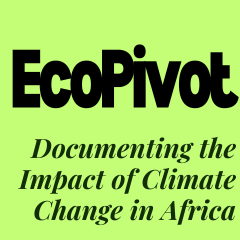In Nigeria, Nwonye Ogechi wrestles with the plastic behemoth that threatens our planet—one discarded bottle, one crumpled wrapper at a time.
A social entrepreneur in Enugu State with a vision etched in eco-friendly ink, Ogechi desires to pivot the world toward change.

“We are surrounded by plastic waste,” Ogechi declares: “we churn out even more than we can fathom as the day goes by.”
Every morning, Ogechi packs her children’s lunches—reusable water bottles, and stainless steel lunchboxes. Yet, as she navigates the chaotic traffic, she witnesses a different reality.
Adults guzzle water from flimsy sachets, toss plastic bottles out of car windows, and sip from disposable cups. The environment groans under this plastic avalanche.
Waste paradox
Nigeria faces significant waste management challenges. Only a tiny fraction of waste is recycled in a country with over 210 million consumers.
According to the National Municipal Waste Management Policy (2020), less than 20% of this waste is collected through a formal system.
Each year, Nigeria discharges a staggering 200,000 tonnes of plastic waste into the Atlantic Ocean, highlighting the urgency of effective waste management and recycling.
Purposeful recycling
In 2019, Ogechi’s awakening arrived. She stumbled upon waste recycling startup, and suddenly, her world shifted. “I had to put my passion to work,” she recalls.
Ogechi eventually founded EcoCyclers —a youth-led startup with grit in its veins: “We focus on waste recycling, climate education, skills acquisition, and environmental actions. We collect plastics, nylons, tin, cans, and sachet waste from households and businesses alike. We manage the recycling process through a series of chains. One needs to have a level of training and an eye for materials that are recyclables from the collections, sorting, and processing.”
EcoCyclers isn’t just about profit—it’s about purpose, she said. Ogechi pays herself and her team, their livelihoods woven into the recycling fabric.
But beyond balance sheets, they weave campaigns—grassroots whispers for cleaner streets, and greener parks.
“We keep promoting people and our planet through our grassroots campaigns on cleaner Enugu and keeping the environment waste-free from pollution,” she told EcoPivot. People now clutch reusable bags and swap plastic wastes for money.
For now, Ogechi leans toward the long term, hoping to compose products from recycled notes—bags, benches, and dreams.
Green School Project
Her green school project, a magnum opus, teaches pupils the 3Rs—Reuse, Reduce, Recycle—while imbibing climate education.
She envisions a generation of environmentally conscious youth, their voices harmonising for a cleaner Earth.
“We want to produce a generation of young people who are particular about our environment,” she told EcoPivot staff.
The school helps students see the beauty in waste, she said. “Our students are creative young people; we see them as catalysts for change.”
At the school, discarded papers become origami cranes, and plastic bottles morph into ottomans. Creativity blooms and change takes root.
As plastic pollution mounts, Ogechi’s Ecocyclers continue to work for a more sustainable Nigeria.


